The following article was written for Socialist Appeal, the British website of the International Marxist Tendency. It discusses the betrayals of the Syriza government in Greece, and explains the lessons of that experience for the British working class and youth should a Corbyn-led Labour government ever come to power.
The last ten years have seen dramatic class struggles across the world as the ruling class has laid the full burden of the economic crisis on the shoulders of the workers, the poor, and the youth. The result of this has been a complete destabilisation of the political situation, as the masses seek to defend themselves and find a way out of the crisis.
Britain in particular is in turmoil. The ruling class has lost control of its own regime and slides towards disaster with its eyes wide open. In the midst of this crisis a Corbyn-led Labour government could come to power on a programme of ending austerity for good.
Now more than ever, socialists must study the struggles of workers around the world and draw important lessons for the fight against austerity. We can learn a great deal from the Greek working class, which has seen the cruellest cuts, the most inspiring struggles and the most tragic defeats in recent history.
Made in Europe
From its epicentre on Wall St, the 2008 crash shook the world. But its shockwaves were felt particularly hard in Europe. Having initially dismissed the financial crisis as an “Anglo-Saxon disease”, the entire Eurozone found itself gripped by a succession of crises. Ireland, Portugal, and even larger economies such as Spain and Italy, were rocked by an avalanche of debt but it was little Greece that would be buried.
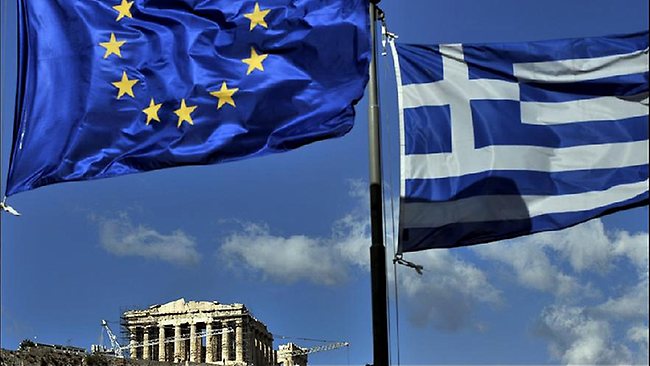 The 2008 crash was felt hard in Europe, and harder still in Greece, whose debt-ridden state was unhooked from a stream of cheap credit / Image: fair use
The 2008 crash was felt hard in Europe, and harder still in Greece, whose debt-ridden state was unhooked from a stream of cheap credit / Image: fair use
What caused this crisis? “Lazy Greeks”, shrieked the German tabloids. Even Angela Merkel said, “It is also about not being able to retire earlier in countries such as Greece, Spain, Portugal than in Germany." The entire blame for the crisis was heaped on the shoulders of Mediterranean workers and pensioners in a touching display of European solidarity.
The real cause of the crisis had nothing to do with the workers of any country however. It was built into the foundations of the Euro itself. The single currency bound weaker economies to the stronger whilst removing their ability to devalue their currencies and cheapen their exports. German goods promptly swamped Southern markets. The effect of this on Greek industry in particular was devastating. Between 2000 and 2011, German industrial production increased by 19.7 percent, while in Greece it declined by 29.9 percent.
But in addition to the profits made by German industry, the titans of European finance also made a killing. The establishment of the Euro was followed by an orgy of lending from French and German banks, which was not simply limited to consumers and homeowners. Major European banks deliberately targeted weaker southern states because they could charge higher interest rates than if they were to lend to the stronger powers, such as Germany.
This produced a virtuous circle of profit making, whereby French banks lent the money to buy German goods, and corrupt Greek bosses hived off millions in offshore accounts. But all good things come to an end. Just as in the USA, where billions of dollars of loans suddenly transformed themselves into a gigantic hole in the balance sheets of the banks, in Europe the crisis went even further, threatening entire states, which had been converted into subprime borrowers themselves.
The bailout
Having formerly been hooked up to a stream of easy credit, the Greek state now found that simply in order to maintain its enormous €300 billion debt pile it would have to borrow at interest rates as high as 10 percent at a time when the economy was not growing but shrinking. Having made spectacular profits for French banks, German monopolies and wealthy Greek tax dodgers, Greece was bankrupt.
By the time Greek bonds received “junk” status in 2010, their value had dropped by 82 percent compared to before the crisis. This was a nightmare for the European banks who held as much as €200 billion in Greek debt. If Greece defaulted, as Lehman Brothers had done in 2008, it wouldn’t just be Greek capitalism which paid for it. The heart of the European banking system would have collapsed. Greece would never be able to pay its debts, but it could never be allowed to default.
The solution was the “First Economic Adjustment Programme for Greece”, signed in May 2010. Under this bailout the Greek state received €107.3 billion of “financial assistance” from the Eurogroup and the IMF, of which 91 percent went straight to the banks. In return, Greece’s “Socialist” Prime Minister had to sign up for a brutal restructuring programme of cuts and privatisations in order to bring the Greek budget deficit down to less than 3 percent. The Greek masses would be forced to pay back billions of euros in bailouts they would never see for a crisis they didn’t cause.
It is currently fashionable to present the EU and the Euro as a triumph of solidarity between European nations. Nothing could be further from the truth. We must call this by its real name: imperialism. In the midst of the First World War, Lenin characterised imperialism as the “domination of finance capital”, meaning “a small number of financially powerful states stand out among all the rest”. What do we see in Greece to this day? An entire nation liquidated in order to protect the interests of a few French and German banks. This should offer us a harsh lesson in the real nature of the “European project”.
Collapse
The bailout may have saved the European banks but it proved disastrous for the Greek economy and the living standards of ordinary Greeks. Between 2010 and 2014, the economy shrank by a quarter, which meant that despite carrying out deep cuts, the Greek state saw its debt-to-GDP ratio rise from 146 percent to 179 percent. Between 2008 and 2012, private sector wages fell by more than 50 percent.
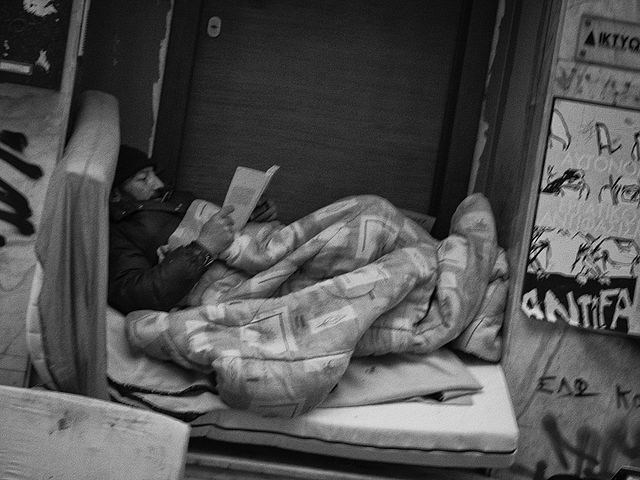 Austerity wreaked havok on the lives of ordinary Greeks, creating a humanitarian crisis in the country / Image: Sascha Kohlmann
Austerity wreaked havok on the lives of ordinary Greeks, creating a humanitarian crisis in the country / Image: Sascha Kohlmann
Such a deep economic crisis, coupled with savage austerity policies, produced a humanitarian crisis in Greece. In just four years, public spending on healthcare was more than halved. In the same period, miscarriages trebled. HIV/AIDS incidence doubled between 2010-12 when the government temporarily stopped distributing syringes. The suicide rate rose by more than a third: the human cost of a youth unemployment rate of 58.21 percent in 2013 – over half of all young adults.
But the crisis was not limited to the youth. In 2012, a Greek pensioner shot himself directly in front of the Parliament building in Athens’ Syntagma Square, leaving a note which said the government had “annihilated any hope for my survival and I could not get any justice”.
The ruling class of Europe was waging a civil war against the workers, pensioners and youth of Greece. But this onslaught was not accepted mutely by the masses. Their struggle was and is an inspiration for workers everywhere.
Heroic struggle
The vicious austerity measures carried out by the Socialist Party (PASOK) government brought an already unstable political situation to boiling point. Days after the Prime Minister, Papandreou, signed up to the “memorandum” setting out the bailout conditions, a 24-hour general strike brought the country to a standstill. That day 500,000 people marched through Athens in what was considered the largest demonstration in Greece since the fall of the military junta in 1974. A group of protestors even attempted to storm the parliament building and the finance ministry was set alight.
Later, in 2011, inspired by the Indignados movement in Spain and the revolutions in Egypt and Tunisia, thousands of protestors occupied Syntagma Square in Athens and set up a people’s assembly demanding the cancellation of the hated memorandum, the refusal to pay some of the debt, taxing the rich, and the adoption of a new constitution. The occupation would last for over 2 months, only coming to an end in August. When polled by a Greek TV channel, 95 percent of the Greek public said they had a positive impression of the movement.
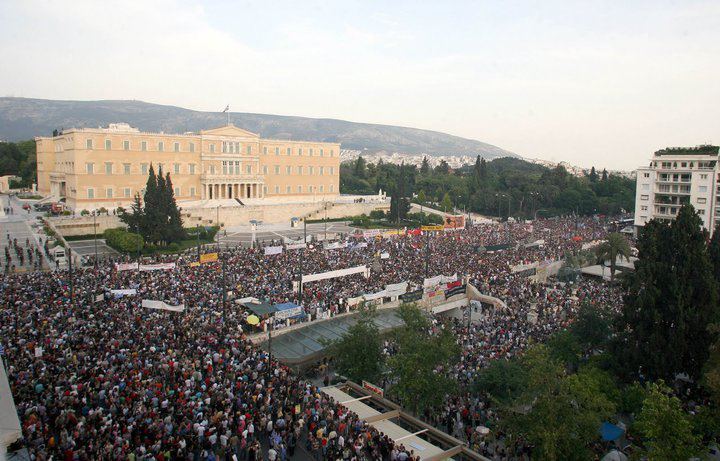 Inspired by the Indignados movement in Spain and the Arab Spring, thousands of protestors occupied Syntagma Square in Athens / Image: fair use
Inspired by the Indignados movement in Spain and the Arab Spring, thousands of protestors occupied Syntagma Square in Athens / Image: fair use
Under this immense pressure the PASOK government limply tried to resist. On 31 October 2011, Papandreou, announced a referendum to decide whether to accept the demands of the IMF, European Central Bank (ECB) and the European Commission – known as “the Troika”. The response by the democratic leaders of the EU was swift and crystal clear: Greece would not receive another cent unless Papandreou was removed in favour of a “national unity government”.
Papandreou dutifully resigned on 9 November and his successor, Lucas Papademos, was sworn in two days later. As a former Vice President of the ECB, he was considered a safe pair of hands by the Troika. The Greek people, however, were not consulted. Once in power, obtained with no democratic mandate whatsoever, Papademos’ puppet regime approved a further round of austerity measures in February 2012, including a 22 percent cut in the minimum wage, €300 million in pension cuts, and the tearing up of workers’ rights.
This could not help but heat up the political situation. The prospect of further cuts imposed direct from Brussels provoked the Greek masses further. As Papademos was presenting its fresh round of austerity measures to Parliament, up to 500,000 people gathered outside demanding an end to austerity, only days after a one-day general strike (one of many) had paralysed the country. One right-wing politician said, “We wanted elections soon because after June there would be a Bolshevik government”.
The rise of SYRIZA
Sadly, the ensuing elections brought not a Bolshevik government but a ‘centre-ground’ coalition, including the right-wing New Democracy (the largest party), PASOK and the “Democratic Left” to power on the promise to “re-negotiate the memorandum”: a promise swiftly forgotten once in power. Far from stabilising the political situation in Greece, this election demonstrated the radicalisation going on under the surface, particularly to the left.
The PASOK, the main party of the working class since the overthrow of the dictatorship, lost over 2 million votes and fell into third place behind SYRIZA, a party which had won only 4.6 percent of the vote in 2009. After years of betrayal and brutal cuts, the historical link between the Greek working class and the PASOK was shattered into pieces.
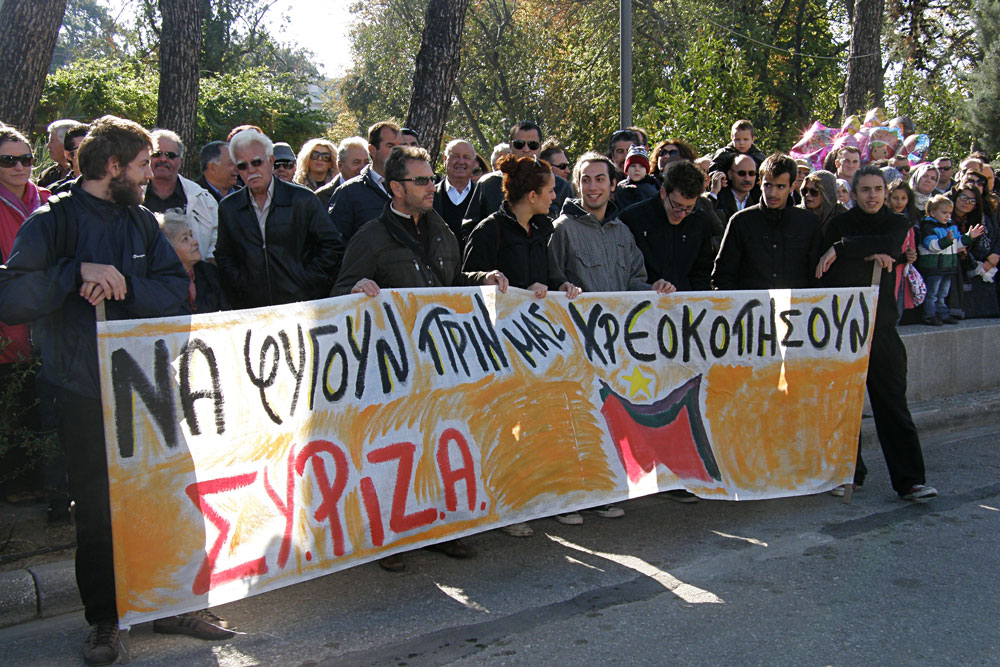 With the rise of Syriza, the old PASOK was wiped out / Image: fair use
With the rise of Syriza, the old PASOK was wiped out / Image: fair use
The collapse in support for the PASOK also held a grim warning for social democratic parties across Europe. When the French Socialist Party was almost wiped out in both the presidential and legislative elections in 2017 it experienced its own “Pasokification”.
The masses were desperately seeking a way out of the crisis. They had come out on demonstration after demonstration. They had participated in over 30 one or two-day general strikes by the end of 2014. And yet every time the Troika called, their parliament voted through cut after cut after cut.
SYRIZA provided a political outlet for the struggle. Having begun its life as a motley collection of various left-wing groups, with the Eurocommunist Synaspismos at its centre, SYRIZA was formed as a party in 2004 and received 3.3 percent of the vote. But the crisis completely transformed the situation.
Between 2009 and 2012 the party gained over 1.3 million votes, becoming the largest opposition party. Three years later, reflecting the insurrectionary mood in Greek society, SYRIZA came to power in January 2015 with over 36 percent in one of the biggest turnouts in Greek history.
Having been elected on a programme of “confronting the humanitarian crisis” in Greece and creating a “national plan to regain employment”, the Greek government of Alexis Tsipras immediately came into conflict with the Troika, which demanded that all the cuts agreed in 2012 must be carried out in full by the government.
All the proposals for wage increases and humanitarian aid for starving Greek workers were rejected out of hand. Even the humiliating concessions offered by SYRIZA in February were dismissed. Only a complete capitulation would be accepted. The message was simple and almost identical to the one given to Papandreou in 2011: not one penny more unless the government commits to the Troika’s programme of vicious cuts, austerity and privatisations.
Pre-revolutionary situation
Trapped in a stand-off and rapidly running out of cash, the Syriza government announced that it would put the Troika’s terms to a Yes/No referendum on 5 July. A hypocritical campaign of intimidation was immediately waged against Greek workers by the ‘respectable’ media in Greece and across Europe. Pensioners were told they would lose all of their savings as a consequence of a “No” vote by the same people who had supported cutting their pensions to the bone.
In spite of this Project Fear campaign, the response of the masses was incredible, surprising even the SYRIZA leaders. On the night of the vote there was a massive “No” (“OXI”) demonstration in Syntagma Square, with roughly 150,000 people there. The result was a crushing victory for “No”. 61 percent voted to reject the Memorandum – 85 percent of the youth. “No” won a majority in every single electoral district but its vote was largest in the most working class districts.
At that time, a pre-revolutionary situation was developing in Greece. The economic and social crisis had become so acute that it had thrown masses of workers and youth onto the streets and in a collision course with the powers of Europe. In the face of a hateful campaign of intimidation, the Greek masses had sent a clear message to their leaders: “Go forward!”
The response of the ECB was to turn off the tap, refusing to provide any more emergency loans to keep the Greek banks afloat. As a result, the banks shut up shop, unable to provide people with cash. There was a stalemate. The Greeks masses were on one side, ready to fight; the banks and the EU were on the other, knife in hand; and Alexis Tsipras found himself stuck in the middle, unwilling to retreat but too terrified to advance.
Revolution Betrayed
There is a tendency on the left to see every defeat as somehow inevitable. After every defeat of the workers there are ‘realists’ who shake their heads and declare, “the working class was not prepared”, or “the workers did not have the sufficient consciousness to win”. Nothing of this nature could ever be said of the Greek masses. The only thing that was lacking was leadership, or rather, leadership worthy of the name.
On the one hand, continuing to be part of the Euro inevitably meant further austerity, but leaving the Euro on a capitalist basis, or “Grexit”, would only have added further crisis and economic collapse to the suffering of the Greek masses. Ultimately, the choice faced by the leadership of SYRIZA was either to capitulate or break with capitalism.
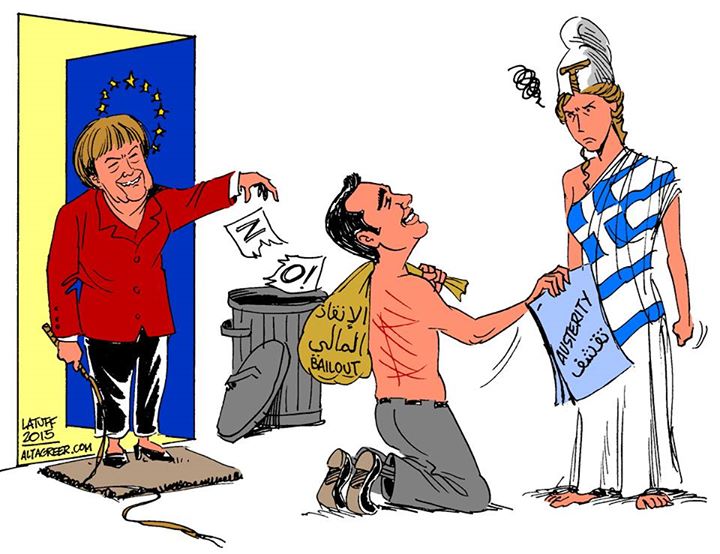 The government eventually buckled to pressure from the Troika, ignored the referendum that overwhelmingly rejected austerity in July 2015, and eventually accepted an even worse deal / Image: Latuff
The government eventually buckled to pressure from the Troika, ignored the referendum that overwhelmingly rejected austerity in July 2015, and eventually accepted an even worse deal / Image: Latuff
With a big majority of the Greek working class behind them they could have expropriated the bankers and tax-dodging Greek capitalists, in order to carry out emergency measures to ensure basic necessities for the suffering Greek people.
Clearly on their own these measures could only have provided temporary relief. A call should therefore have been made out to the workers of Europe to join Greece in breaking with the imperialist policies of the EU and fighting for a Socialist United States of Europe. This could have sparked a flame across Europe, where workers all over the continent had been watching Greece with bated breath.
Trotsky commented as far back as 1906 that, “To flee before the organized opposition of capital would be a greater betrayal of the revolution than a refusal to take power in the first instance. It would really be far better for the working-class party not to enter the government than to go in so as to expose its own weakness and then to quit.” This could not be more true in relation to Greece.
The government even accepted a worse deal than the memorandum rejected in July 2015.
On 14 August, after a rancorous all-night debate, the Hellenic Parliament backed the country's new bailout deal, although more than 40 MPs from Syriza voted against the deal and Tsipras had to rely on the support of the opposition: New Democracy, To Potami and PASOK.
The betrayal had a disastrous effect on consciousness. The workers had given everything, done everything asked of them, and yet they were worse off than before. This despondency was reflected in the super-low turnouts of the last election, another legacy of Tsipras’ “anti-austerity” government.
New battles ahead
The election of a New Democracy government this year is a double-edged sword for the Greek ruling class. On the one hand it will be sure to attack the workers even more reliably and less apologetically than the previous regime. But it will also be much less capable of holding the masses back. The brave Greek workers will once again have their say. We owe them our unconditional support.
In other countries too the workers are moving against austerity and future left governments such as that of SYRIZA are on the order of the day. But once our attack on austerity has begun, we must be prepared to fight to the finish. This is the enduring lesson of Greece.
If we are to win, we must be prepared to break with this rotten system, nationalise the banks and monopolies under democratic workers control and transform society. In this we could rely on the strength and support of millions of workers, mobilised to end austerity and create a future fit for our children.

